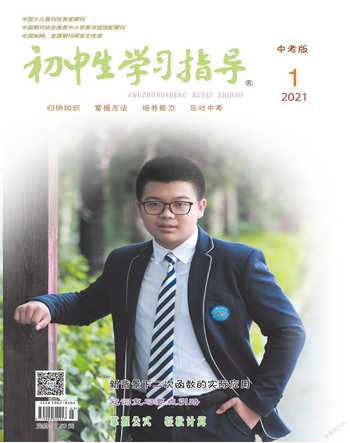冠词复习要点引路
朱秀兰
冠词是一个虚词,它置于名词之前,限定名词的意义。冠词可分为定冠词、不定冠词和零冠词三类。
一、不定冠词:a / an
1. a /an 用于单数可数名词前。a用于辅音发音开头的词前,如:a book, a man;an用于元音发音开头的词前,如:an apple, an hour.
2. 表示类别。这种用法是指某人或某物属于某一种类,或者指某一种类的人或物中的任何一个或一件,或者指某一种类的人或物,但不具体说明是何人或何物。如:
Give him an apple, please!
Listen!A girl is singing over there.
3. 表示基本单位,作“每一”讲。如:three times a day, thirty miles an hour.
4. 不定冠词可置于序数词前,表示数量或序数的增加。如:a second time.
5. 不定冠词用在姓名前,表示说话者不认识此人。如:There’s a Miss Lin waiting for you. (有位林小姐在等你。)
6. 第一次提到某人或某物时,要用不定冠词。如:You need to see a doctor.
a / an和one的区别:
a / an 表示類别、种类,one强调数量。如:
a car(表示是一辆小汽车,而不是一辆公交车,也不是火车。)
one car(强调是一辆车,而不是两辆或三辆。)
二、定冠词:the
1. the表示特指,表示名词所指的人或事物是同类中的特定的一个,以区别于同类中其他的人或事物,相当于汉语中“那个”或“这个”的意思。如:the dog under the tree, the bananas in the basket.
2. the 可以用于可数名词前,也可以用于不可数名词前,表示特指。如:the teachers, the bread.
3. 表示再次提到上文提到过的人或物。如:There is a child in the room. The child is my brother’s son.
4. 用在谈话双方都知道的人或物前。如:Let’s go and give it to the teacher.
5. 用于某些固定词组中。如:in the morning / afternoon / evening等。
6. 用在形容词前表示一类人。如:the young(年轻人),the rich(富人)。
7. 用在表示“姓”的复数名词前,表示一家人或夫妇二人。如:
The Whites came to China three years ago.
8. 用在由普通名词构成的国家、党派、组织机构、场所等专有名词前。如:the Great Wall(长城)。
9. 用在序数词或形容词、副词的最高级前。如:the first class, the tallest boy.
10. 用在世界上独一无二的事物名词(月亮、地球、天空、宇宙)前。如:the sun ,the moon.
11. 用在世纪、年代名词前。如:in the1990s, in the 21st century.
12. 用在江河、山脉、湖泊、海洋、群岛、海峡、海湾、运河等前。如:the Pacific Ocean.
13. 用在介词短语中。如:behind the door.
14. 用在西洋乐器名词前。如:play the piano.
15. 用在形容词或副词的比较级前,这时通常有表示范围的of短语修饰。如:
He is the taller of the two.
16. 在“the+比较级, the+比较级”句型中,不可省略。
三、零冠词:即不使用冠词
1. 在物质名词、抽象名词前用零冠词。如:The desk is made of wood.
2. 国名、地名、人名前通常用零冠词。如:England, Kunming, Mary.
3. 在星期、月份、季节等名词前用零冠词。如:Sunday, March, summer.
4. 名词前有物主代词、指示代词、不定代词、名词所有格等修饰时,用零冠词。如:this morning, my pen,whose bike.
5. 在球类运动、一日三餐、学科和语言的名词前用零冠词。如:have lunch, play basketball.
6. 当by与火车等交通工具连用,表示一种方式时,中间用零冠词。如:by bus, by train.
(注意:如果用介词 on / in 表示乘坐交通工具,必须用a或an来表示。如in a bus ,on a bike等。)
7. 称呼语和表示头衔的名词前用零冠词。如:Mr. Read, Doctor Wang.
8 在表示颜色、语言的名词前用零冠词。如:It’s green. He speaks English.
9. 在某些固定词组中用零冠词。如:go to bed, in memory of.
10.有些个体名词前用零冠词。如:school, college, prison, market, hospital, bed, table, class, town, church, court等个体名词,直接置于介词后,表示该名词的深层含义。如:go to hospital, 去医院看病;go to the hospital, 去医院(并不是去看病,而是有其他目的)。
練兵场
1.-Dose Jim have pencil ?
-Yes, he has .
A. an;some B. a;one C. a;/ D. any;one
2.There is old chair. old chair is Mr Li’s.
A. an;The B. the;An C. a;The D. the;The
3. apple a day keeps the doctors away.
A. The B. A C. An D. Two
4.-How many books do you have?
-I have book. That’s English book.
A. a;an B. a;one C. one;an D. one;one
5.At that time Jim was one-year-old baby.
A. a B. an C. the D. /
6. panda is China.
A. The;a B. A;from C. The;from D. The;the
7. We can’t see sun at night.
A. the;the B. the;/ C .a;/ D. / ;/
8. useful book it is!
A. What an B. How a C. What a D. How an
9. One morning he found backpack . There was “s”on the corner of backpack.
A. a;an;the B. a;a;the C. an;an;an D. the;a;a
10. old man with white hair spoke English well at meeting.
A. An;an;a B. The;/;an C. The;/;a D. The ;/ ;the
11. Great Wall is longest wall in the world.
A. A;a B. The;the C. A ;the D. The;a
12 . new bridge has been built over Huangpu River.
A. The;a B. A ;/ C. A;the D. An; the
13. man over there is popular teacher in our school.
A. A ;an B. The;a C. The;the D. A;the
14. He used to be writer but later he turned teacher.
A. a;a B. a;the C. /;a D. a;/
15. They made him king.
A. a B. the C. an D. /
答案:
1-5:BACCA 6-10:CBCAD 11-15 :BCBDD

